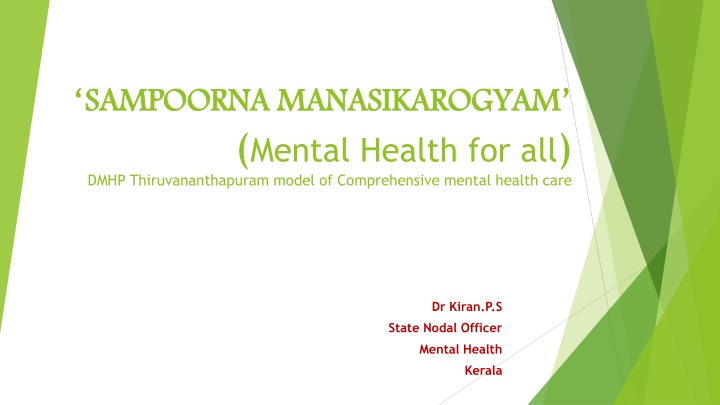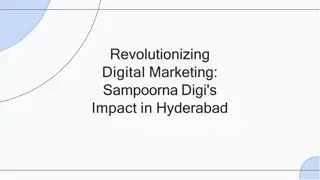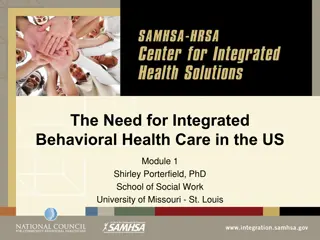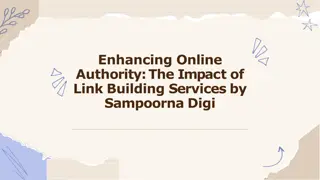Comprehensive Mental Health Care Model: Sampoorna Manasikarogyam in Thiruvananthapuram
Sampoorna Manasikarogyam is a mental health care program implemented in Thiruvananthapuram, Kerala, focusing on integrating mental health services into primary care. Through community interventions, camps, and involvement of grassroots workers, the program aims to detect undetected cases, provide access to mental health care, and close the treatment gap. Various activities such as sensitization, training, house visits, camps, and follow-ups are conducted to ensure effective mental health care delivery. Funding is obtained with support from Gramapanchayaths, with PHC being the implementing agency.
Download Presentation

Please find below an Image/Link to download the presentation.
The content on the website is provided AS IS for your information and personal use only. It may not be sold, licensed, or shared on other websites without obtaining consent from the author.If you encounter any issues during the download, it is possible that the publisher has removed the file from their server.
You are allowed to download the files provided on this website for personal or commercial use, subject to the condition that they are used lawfully. All files are the property of their respective owners.
The content on the website is provided AS IS for your information and personal use only. It may not be sold, licensed, or shared on other websites without obtaining consent from the author.
E N D
Presentation Transcript
SAMPOORNA MANASIKAROGYAM (Mental Health for all) DMHP Thiruvananthapuram model of Comprehensive mental health care SAMPOORNA MANASIKAROGYAM Dr Kiran.P.S State Nodal Officer Mental Health Kerala
The delivery of mental health services through primary health care system as a policy for developing countries was recommended by WHO, as the burden of mental disorders is 10-12% and treatment gap is 80% for mental disorders. Needed an implementation model to detect the case burden in the community, to enable access to mental health care system and to close the treatment gap. DMHP Tvpm had become the first district to attain mental health integration into primary care in 2014, where weekly mental health clinics are being conducted in all PHCs & CHCs by trained doctors, and patients are getting Mental Health treatment & medicines from their nearest PHC. It is in this scenario that DMHP Tvpm has devised and put into action its new endeavor of Sampoorna manasikarogyam with the objective of :- Finding the undetected case burden in the community by interventions & camps. Involving community level workers in detection, management and follow up of cases in their community Integration of newly detected cases to primary care health system
The protocol is as follows. Sensitization of members of Block panchayath and Gramapanchayath on mental health. Sensitisation of CHC & PHC staff- Health workers(JPHN,JHI) Training of grass root level workers-ASHAs( or Health Volunteers) on Mental Health awareness creation, Stigma Reduction & Screening with Case detection Forms CASE DETECTION CAMPAIGNS ASHAs visit Every Household in the panchayath, give brief mental health awareness class with leaflets,& Screens with structured DMHP case detection forms. Information on camp date given Case detection forms evaluated by DMHP team. Families with detected cases are intimated to attend camp at nearby PHC by ASHA workers. Mental health camp in concerned PHC involving DMHP team,& PHC Staff. Three review camps in following successive months to cover the entire cases detected by repeated intimation by ASHA, and follow ups of newly diagnosed cases Stable cases are transferred to PHC Medical Officer who will conduct weekly/monthly(depending upon the number of patients) Mental Health Clinics in the PHC. Medical Officer, Pharmacist, Staff nurses and Health workers are trained by DMHP TVPM, and they support the management, drug dispensing and records keeping in the PHC. Follow up plans for rehabilitation units in the community, involving Health workers & LSG Members DMHP team directly conducts review camps every 6 months. Evaluation of data and analysis
Expenditure split up Sl.NO Activities Amount in Rs 1 Sensitization of LSG Members, PHC Staff 2000 2 Training of ASHAs (Half day training) 3000 3 House visit Remuneration for ASHAs Rs 150/day x 10days x 15 wards(avg) 22,500 4 Medical camp 3000 5 3 review camps 4500(1500x3) 6 Printing of awareness leaflets, posters, questionnaire 4000 7 Awareness classes in local schools, kudumbasree units, ICDS units and other institutions in the panchayath 4000 Total 43000/-(Forty three thousand ) Funds are provided by Gramapanchayaths for which DMHP gives Proposal through the PHC Medical Officer. PHC is the Implementing agency for the funds received.
Comparative data of the programme in 3 selected panchayaths Grama panchayaths Kallikkad Cherunniyoor Kuttichal population 14,724 22,138 18,750 Houses visited 5002 5519 5249 wards 13 14 13 Mental health awareness classes 1.PHC Staff 2.ASHA workers 3.Health Volunteers 4.Panchayath members 5.School teachers (60 members) 1.PHC Staff 2.ASHA workers 3.Panchayath members 1.PHC Staff 2.ASHA workers 3.Panchayath Members 4.School teachers (60 members) (65 members) Duration of case detection campaign 8 days 8 days 7days Screened Cases 322 384 546 Medical camp 1 1 1 Review camps 3 reviews 3 reviews 3 reviews New cases detected 89 93 128
Data Analysis The clinics conducted by DMHP are 22 per month(in CHCs) and one Sampoorna Manasikarogyam once in a month. The mean average of new cases detected in the DMHP clinics in a month and in the case detection campaign once a month were evaluated. DMHP Number/month NEW CASES (direct) MEAN Clinics (CHC) 22/month 415 46 cases/month 1/month 310 103cases/campaign/month Sampoorna Manasikarogyam(PHC) RESULT New cases detected through campaigns are more than twice the number of cases that directly seek a DMHP Clinic. The three case detection campaigns covered a population of 55612 through 15770 houses, screened 1277 prospective cases of which 310 cases diagnosed with psychiatric morbidity, were treated in mental health camps and integrated to primary health care. Cases detected per campaign through this model are twice (2.15 : 1) that through monthly DMHP clinics.
Data Analysis Panchayath Kallikad Cherunniyoor Kuttichal Total (Tribal area) RESULT DMHP Clinics (in Block CHCs) Prior to the progrm 9 11 8 28 Sampoorna Manasikarogyam 89 93 128 310 More than 10 times increase in number of patients through case detection in the community by screening, than the direct seeking of psychiatric care system by patients.
At the rate of one camp per month 12 GramaPanchayaths can be successfully completed a year with collaborative work between DMHP, Grama Panchayath & PHC Cost effectiveness-as the already existing health machinery is being used Fund allocation from local Panchayath. LSG members become aware of the problems faced, and welfare schemes available for mental patients, so becomes more involved Extending similar activities to areas where specialist care is inadequate. One time manpower assortment can meet the needs of the camp and the follow up through primary care integration would maintain the sustainability of provision of care. Training activities to be two parallel process of top down for primary care doctors for successful integration through clinics and bottom up from the community for identifying the major part of undetected case burden. Secondary level activities of community based rehabilitation, establishment of Day Care Centres and other targeted interventions like school mental health in the community are facilitated. It is an effective way of detecting case load at one go. The program can be adapted to the needs and availability of resources in other areas. ASHAs become grassroot level workers for Mental Health in the Gramapanchayath. They are approached by the people for clearing doubts and seeking modes of treatment for newly developed cases.They also help to ensure regular follow ups and reduce Treatment Dropouts
Conclusion Programme has already been successfully implemented in 13 Gramapanchayats, and is being planned to be scaled to 171 Gramapanchayats as part of ARDRAM Mission, and later to all Gramapanchayats and Municipal- Corporation wards in the state. Average expenditure for a Gramapanchayat is about Rs 40,000/- which makes the programme economically feasible and sustainable. Sampoorna Manasikarogyam is a comprehensive model of sensitization, mental health training, case detection campaigns and camps, enabling detection of the unidentified case burden in the community. Their integration to primary care clinics enables follow ups, overcomes treatment gap and improves access to mental health care. THANK YOU























